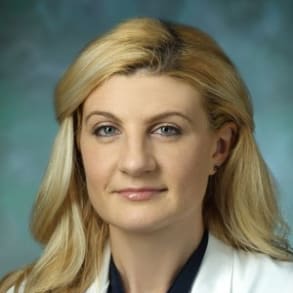Minimally invasive surgeons Brett Parker, Alisa Coker, and Katherine Lamond discuss the risk factors for Barrett's disease as well as surgical options for GERD and Barret's. They will also cover how surgical intervention can help Barrett's disease.
mm hmm, mm hmm, mm hmm. Yeah. Good afternoon. My name is Katherine Lamont. I am an assistant professor of surgery based here at Sibley Memorial Hospital in D. C. Hi everyone. My name is Brett Parker, minimally invasive surgeon. Um johns Hopkins, also based out of Sibley Memorial here in D. C. And I'm Melissa Coker, assistant professor of surgery. And I'm at the main campus for johns Hopkins in Baltimore. Um so we appreciate everyone for joining us today. We're hoping to provide some information on GERD and barrett's and how those are related and when it might be appropriate to refer a patient for a surgical evaluation. Uh so Brett I want to start with you. Can you kind of educate us a little bit on what are the risk factors for ferrets? Yeah. Absolutely. Um so there there's several documented risk factors for barrettes. Um It occurs primarily in the setting of longstanding gastroesophageal reflux disease and chronic injury to the esophagus. So um you know having a documented history more than five years um is a risk factor. Um It also has found more commonly in men over women and patients over 50 years old. Um smoking has been noted to be a risk factor as well. Um You know Ohio two hernias in the rows of esophagitis as well. So I feel like we all see a lot of patients that are referred to us for good and for Barrett's but I know there's a lot of patients out there that aren't. So can you tell us when you would want to see these patients. When is an appropriate time for one of our referring providers to send them our way. Sure. So there are a lot of different physicians that are usually involved in these patients depending on the symptoms they're having. Sometimes a patient will prevent present rather to a gastroenterologist or the primary care doctor with symptoms of reflux debilitating heartburn or even mid epa gastric pain. Um I think it's reasonable to be referred to a surgeon when those uh discomforts become debilitating when patients have reflux disease. That is breakthrough symptoms on PP. I. Therapy if they're on the I. D. P. P. I. Therapy or um they have any concerning findings on any of their studies that they may have received messages and upper gi or ct scan? I would agree with that. I think it's also a reasonable time to ask a patient if they would like to see a surgeon because I think a lot of patients aren't even aware that there are surgical options for this um things that we can offer them that will help prevent progression of their barrettes too. High grade dysplasia and eventually cancer. Um And so I think it's important for them to have that discussion early on. And I would encourage that. So let's talk about what those surgical options are Brett can you give us a rundown on what are the options that you offer your patients when they come to you with these problems. Yeah. Absolutely. Um And I agree with you you know getting patients in early spectrum disease that really opens up their options. Um You know most of the time we see barrett's esophagus and and medically refractory GERD patients in the setting of a hydro hernia. So most of these options would require a hydro hernia repair as well. And then it's just a matter of tailoring that procedure to um suit the patient's physiology and anatomy. So um you know we do quite a bit of objective testing pre operatively to determine who is a candidate for what surgery. Um But in general there are several options. The fund application is tried and true. It's the most classic approach where you wrap the stomach around the bottom of the esophagus to recreate that high pressure zone and reinforce the lower esophageal sphincter. And that can be tailored several ways. Partial fund applications, complete fund applications and in various configurations. Um We also offer the links device um or magnetic sphincter augmentation which is a complete barrier as well. Um It's a ring of magnetic beads that they go around the lower sandwiches to reinforce the lower esophageal sphincter as well. Um And that's typically uh in patients who have documented um s official motility that that's not ineffective or weakened. So so we know they could tolerate that uh that procedure. Um There's the trans oral incision list fund application which is another option originated in the endoscopy suite as an alternative to surgery for patients who um didn't have idle hernias and and early spectrum disease. And we've actually brought that device into the operating room as well and we're um combining that with a spinal hernia repair. So um that's termed a seat if or combined trans oral incision this fund application and we're one of the few centers in the country offering that as well. Um And then as all of us here do weight loss surgery. We also know how to recognize patients with morbid obesity and also co morbidity such as gastroesophageal reflux disease. That may benefit from a roux en Y gastric bypass not only to treat their reflux but also their their comorbidities and and um obesity. Really good point that gastric bypass is also an option for some of these patients. Um I think you know for us we all know we're part of the division of minimally invasive surgery. It says that on our coat but I think it's important to stress that to our providers to so okay can you talk about how these procedures are performed? Are we still doing them through big open incisions? I think it's a really important point that we make to our patients is that we always attempt to um do minimally invasive surgery for all of these techniques, whether it be the full funding application or the partial wraps. Um Certainly the trans oral versions of these procedures can be done without any incisions at all. Um But in general we will talk to the patients about what options will work best for them. Um Also depending on how what stage they're in and what where they are in their surveillance. Um And in terms of the ruin y gastric bypass I think it's really important that the referring providers that you don't need to make these decisions. We will help with the work up along the way. Um Oftentimes it can feel really intimidating um To say well I'm not sure if I have all the studies before my referrals but that's okay. We can help organize manama tree and ph studies um And E. G. D. S if the if the patients haven't had them yet. Yeah totally And we're always happy to discuss what would be useful beforehand as well. Um I think it's also a good distress that amongst all of us you know not just us but we have other partners that are included here today. We're able to offer a lot of these different approaches. Um And I think that's important. I think for me for example the majority of my hiatus hernia repairs and fund applications are done robotically and I think for some of its laproscopic. Um But probably most importantly it would be rare to to have to do that as an open procedure. Um I also think we can't just dismiss the fact that especially maybe in the past that these operations have had a little bit of a bad rap. You know, it's not uncommon that I've heard from patients that they said, oh gosh, I've been suffering with these symptoms forever. But my my G. I. Doctor, my primary care doctor said, don't go get that done because it's got all these horrible side effects. Um And so I think it's good to stress what we offer. Maybe that's different than what they've seen otherwise. Um And that's that's uh we're all fellowship trained minimally invasive surgeons. That means we spent at least a year of our life learning to do these procedures and we do a lot of it. I know for me it's about half of my practice. Um And so I feel like we're able to offer a very high quality procedure. Um And that despite a lot of the bad rap that you hear out there, no pun intended, um they're they're definitely high satisfaction rates with this procedure. You know, there have been studies out there that looked at over, you know, just 1000 people asking them, how do you feel about this? And there's over 90% satisfaction rate um In addition to them just feeling better in terms of GERD symptoms Brett, can you tell us, what do we know about people who have parrots and they get a fundo application um you know, in terms of progression to high grade dysplasia, for example. Yeah, sure. So, so I I just wanted to agree with everyone. I agree that the the surgical interventions thus far um have had a bad reputation and and have um you know, I thought that they are plagued with complications and and and you know, lifestyle changes and um poor outcomes and and getting the patients in early to talk about that is certainly an advantage. And I'm really happy that we're doing outreach like this to make sure that um you know, that that reputation has changed. I think it's a surgeon's responsibility to do that. Um You know, now that we are offering minimally invasive approaches um in response to your question, you know, I I think that the the reason we don't see a lot of these patients is because they are managed medically, um you know, either through their primary care physician or gastroenterologist. And um you know, we we know that surgery um can do just as much if not more in managing their barrett esophagus. And and not only um stopping progression like you mentioned, but also inducing regression. Um You know, a lot of the the barretts patients uh need to be quantified as to whether there uh metal, plastic or dis plastic and and if they have dysplasia, whether they have low grade or high grade and that will really change the rates of progression to esophageal cancer, which is our main concern. Um but in general um you know, patients that undergo um anti reflux surgery can induce regression of their barrett's esophagus and I think that's an important point to take home. Yeah, really important. Um It's also true that a lot of patients come to us just for symptoms and they're on P. P. I. S. Right? Um So kate for those patients who really want to come off their P. P. I. Or their providers think that it might benefit them because of potential long term risks of P. P. I. What do you quote them in terms of ability to get them off that medication? Well, in terms of making the bridge from medical therapy to surgical therapy, there are obviously a lot of factors involved, especially whether they have a component of a hiatus hernia or parapsychology, a hernia because of the paris opera. Geul hernias really do need to be evaluated for surgical fixation. Um And all of the symptoms can be managed with medical therapy. And true, there can be long term side effects from the medications long term. I typically discuss with patients how debilitating it is to take a medication every day. Um And I also sometimes have them try to take the medication every other day um to decrease their medical therapy. And then I talked them through different options in terms of surgical interventions. True, in addition to having to take that medication daily, you know, the patient should also be aware. You know, one of the risks of not having surgery if you will is really that continued persistent need for surveillance of their barrettes right? While that won't necessarily go away in the short term. Um it's even more important if they choose not to have any kind of anti reflux procedure that they have to undergo those procedures regularly to surveil their bands. Yeah. And in general, you know, I I like to have the discussion with patients that um you know, if if we perform anti reflux surgery um for their refractory GERD or their barrettes, there's a really good chance that we can get them off of their medication. Um You know, for example, my standard protocol is to stop the medication the day of surgery and then we follow them and you need to follow them objectively or subjectively. And, you know, I'm very upfront with my patients and I tell them that there is a small chance you go back on your medications at some point in the future, But in some situations, say 10 or 20 years off of medications is still considered a success, a surgical success. You know, you've altered their anatomy, you've corrected their reflux for that period of time. And then, you know, say it does break down or where wear out over time and they go back on their medications, they still had a very long period of time without gastroesophageal reflux disease. And so, um, you know, although it's not a 100% certainty that they go off of their medications for life. It's a very good chance to go off it for many, many years. So Brett kate had mentioned that there are quite a few studies that we often require as part of the work up leading to the operating room. Um I think there are some maybe referring physicians out there that are are concerned that once they send a patient to us that they're not going to have ownership over them anymore. So kind of talk to you about how you manage that relationship and the need for all those studies with that referring provider. Yeah, absolutely. Um you know, it's it's complex and and that's because we want to do the right procedure on the right patient, that requires a lot of objective testing. Um So in the situation where we have a diagnosis of barrett's but maybe incomplete forgot work up. Um there is a burden on the primary care for provider or the gastroenterologist to coordinate that and arrange that prior to presenting that to the patient to the surgeon. Well, you know, obviously within our center, we don't we don't necessarily require that. We have no problem completing that work of ourselves uh and in assisting and arranging that. Um and so yeah, we may step in and assist with some of the objective testing prior to surgery and that's really just to make sure we identify the patients candidacy and tailor the procedure. Um but we certainly don't expect to take over fully. And the reason for that is because barrett's esophagus is managed in a multidisciplinary way it requires not only the surgeon but also the gastroenterologist and primary care provider. Um you know, much of the advanced stages of barrettes, you know, this plastic barrettes long segment barrettes um is managed with indo therapy first and foremost, prior to the surgeon even meeting the patient. Um and uh certainly after surgery requires ongoing surveillance um and making sure that patient isn't lost to follow up, making sure that patient doesn't have progression of Barents to esophageal cancer uh takes a village. And so the surgeon can't do it alone. And certainly we welcome and encourage ongoing long term care to be provided by the primary physician and the gastroenterologist as well. I agree. It's definitely a multidisciplinary approach, I'd say more often than not. Most of my referral referrals for barrettes now are sent to me pre kind of any ablation therapy with the plan being, hey, let's control your reflux first. Let's give you some kind of anti reflux procedure. And then we'll plan for an ablation afterwards. Yeah, absolutely. And we also have the ability to recognize and identify patients who have advanced um disease and may benefit from being triaged by a thoracic surgeon uh as well, you know, in the case that in the rare case that they fail indo therapy or mucosal resection for discussion about a subject to me. So it's a one stop shop and in a comprehensive center. I agree. Well, I hope that this was very useful for anyone watching. I want to stress that, uh, we would love to answer any questions that anyone might have, that we can provide any clarification. Uh, we would love to be able to consult with your patients and educate them directly. Uh, so please reach out if we can be of assistance in that manner. Thanks lisa. Thanks. Okay. Yeah.





